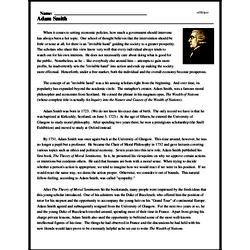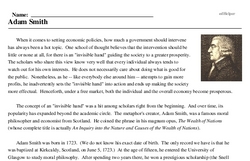Adam Smith
When it comes to setting economic policies, how much a government should intervene has always been a hot topic. One school of thought believes that the intervention should be little or none at all, for there is an "invisible hand" guiding the society to a greater prosperity. The scholars who share this view know very well that every individual always tends to watch out for his own interests. He does not necessarily care about doing what is good for the public. Nonetheless, as he -- like everybody else around him -- attempts to gain more profits, he inadvertently sets the "invisible hand" into action and ends up making the society more effectual. Henceforth, under a free market, both the individual and the overall economy become prosperous.
The concept of an "invisible hand" was a hit among scholars right from the beginning. And over time, its popularity has expanded beyond the academic circle. The metaphor's creator, Adam Smith, was a famous moral philosopher and economist from Scotland. He coined the phrase in his magnum opus, The Wealth of Nations (whose complete title is actually An Inquiry into the Nature and Causes of the Wealth of Nations).
Adam Smith was born in 1723. (We do not know his exact date of birth. The only record we have is that he was baptized at Kirkcaldy, Scotland, on June 5, 1723.) At the age of fifteen, he entered the University of Glasgow to study moral philosophy. After spending two years there, he won a prestigious scholarship (the Snell Exhibition) and moved to study at Oxford instead.




